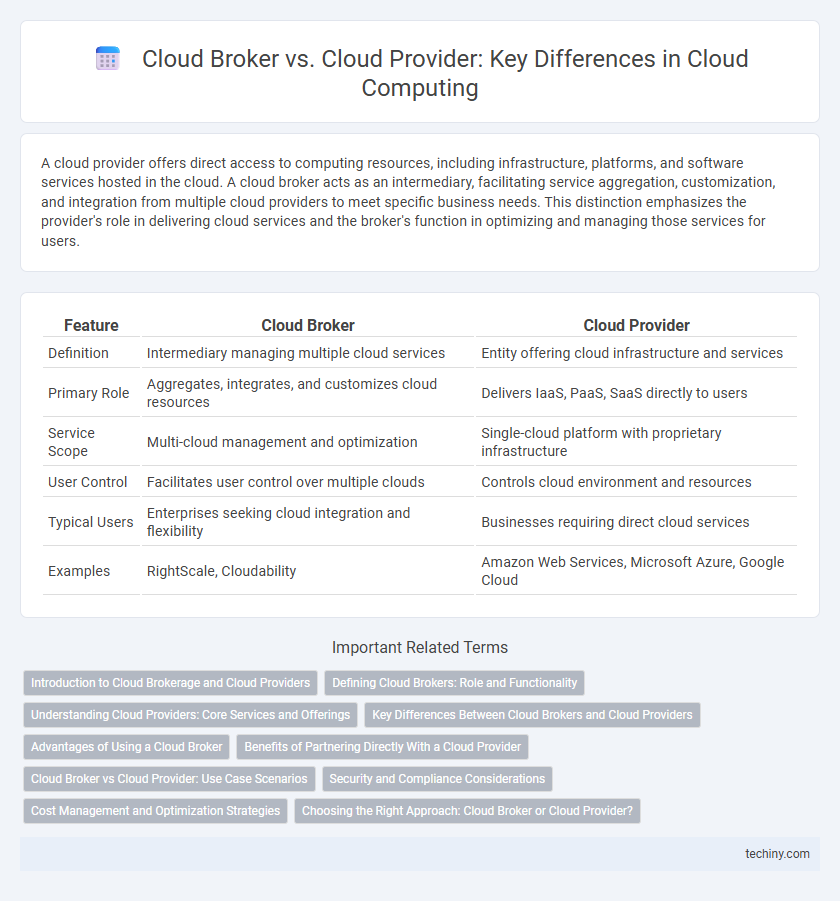A cloud provider offers direct access to computing resources, including infrastructure, platforms, and software services hosted in the cloud. A cloud broker acts as an intermediary, facilitating service aggregation, customization, and integration from multiple cloud providers to meet specific business needs. This distinction emphasizes the provider's role in delivering cloud services and the broker's function in optimizing and managing those services for users.
Table of Comparison
| Feature | Cloud Broker | Cloud Provider |
|---|---|---|
| Definition | Intermediary managing multiple cloud services | Entity offering cloud infrastructure and services |
| Primary Role | Aggregates, integrates, and customizes cloud resources | Delivers IaaS, PaaS, SaaS directly to users |
| Service Scope | Multi-cloud management and optimization | Single-cloud platform with proprietary infrastructure |
| User Control | Facilitates user control over multiple clouds | Controls cloud environment and resources |
| Typical Users | Enterprises seeking cloud integration and flexibility | Businesses requiring direct cloud services |
| Examples | RightScale, Cloudability | Amazon Web Services, Microsoft Azure, Google Cloud |
Introduction to Cloud Brokerage and Cloud Providers
Cloud providers deliver infrastructure, platforms, and software services directly to users via the cloud, managing resources, security, and maintenance. Cloud brokers act as intermediaries, aggregating and integrating multiple cloud services to optimize selection, pricing, and provisioning for businesses. This brokerage enhances cloud adoption by simplifying service management and improving cost efficiency across diverse cloud environments.
Defining Cloud Brokers: Role and Functionality
Cloud brokers act as intermediaries between cloud providers and consumers, facilitating the selection, integration, and management of multiple cloud services to optimize cost, performance, and compliance. They provide value-added services such as service aggregation, customization, and deployment automation across public, private, or hybrid cloud environments. By abstracting the complexity of multi-cloud architectures, cloud brokers enable businesses to efficiently manage diverse cloud resources and ensure seamless service delivery.
Understanding Cloud Providers: Core Services and Offerings
Cloud providers supply fundamental cloud computing services such as Infrastructure as a Service (IaaS), Platform as a Service (PaaS), and Software as a Service (SaaS) that enable businesses to deploy, manage, and scale applications and resources on-demand. Key offerings include virtual machines, storage solutions, networking capabilities, and managed databases, supported by global data centers to ensure reliability and performance. Understanding these core services is essential for optimizing cloud infrastructure and leveraging the full potential of cloud environments.
Key Differences Between Cloud Brokers and Cloud Providers
Cloud brokers act as intermediaries facilitating the selection, integration, and management of multiple cloud services from various cloud providers, optimizing cost and performance for businesses. Cloud providers deliver the underlying cloud infrastructure, platforms, or software services directly to end-users, managing resources like virtual machines, storage, and applications. Unlike cloud providers, cloud brokers do not own or maintain cloud infrastructure but focus on service aggregation, customization, and value-added services such as security and compliance management.
Advantages of Using a Cloud Broker
Using a cloud broker offers enhanced multi-cloud management by aggregating services from multiple cloud providers, optimizing cost, performance, and compliance efficiently. Cloud brokers provide customized service level agreements (SLAs) and unified billing, simplifying vendor interactions and reducing operational complexity. Access to expert support and cloud cost optimization tools further enables businesses to maximize cloud resource utilization while maintaining agility and scalability.
Benefits of Partnering Directly With a Cloud Provider
Partnering directly with a cloud provider ensures seamless access to the latest innovations, enhanced security protocols, and optimized performance through native integration. Direct collaboration reduces latency and service disruptions by leveraging the provider's global infrastructure and support teams. Organizations benefit from cost savings and customized solutions tailored specifically to their unique operational requirements without intermediary fees.
Cloud Broker vs Cloud Provider: Use Case Scenarios
Cloud brokers facilitate the aggregation and customization of services from multiple cloud providers, enabling businesses to optimize costs and tailor solutions without managing each provider individually. Cloud providers deliver the core infrastructure, platforms, and software services directly to end-users, supporting use cases that require scalable, reliable, and secure resource access. In multi-cloud strategies, cloud brokers are ideal for enterprises seeking unified management and integration, while cloud providers remain essential for organizations requiring dedicated control over specific cloud environments.
Security and Compliance Considerations
Cloud brokers enhance security and compliance by offering centralized management of multiple cloud providers, enabling unified policy enforcement and risk assessment across diverse environments. Cloud providers deliver foundational security features such as data encryption, access controls, and compliance certifications like ISO 27001 or GDPR adherence, but their measures are specific to their own infrastructure. Opting for a cloud broker allows organizations to better address regulatory requirements and streamline audit processes by consolidating visibility and control over multi-cloud security postures.
Cost Management and Optimization Strategies
Cloud brokers aggregate services from multiple cloud providers to offer optimized pricing and tailored cost management solutions, enabling organizations to avoid vendor lock-in and reduce overall expenses. Cloud providers set base pricing models and offer native tools for cost monitoring and resource optimization but may have limited flexibility in cross-platform cost efficiency. Leveraging a cloud broker enhances cost optimization strategies by providing real-time cost comparisons, automated resource allocation, and consolidated billing across diverse cloud environments.
Choosing the Right Approach: Cloud Broker or Cloud Provider?
Choosing the right approach between a cloud broker and a cloud provider depends on your organization's specific needs for flexibility, cost-efficiency, and vendor management. Cloud brokers aggregate multiple cloud services, enabling seamless integration and optimized resource allocation across platforms like AWS, Azure, and Google Cloud. In contrast, cloud providers offer direct access to their own infrastructure, delivering specialized services and greater control but less multi-cloud interoperability.
Cloud Broker vs Cloud Provider Infographic

 techiny.com
techiny.com